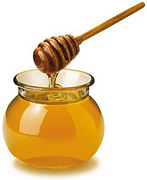Honey in the Raw
By Zhenya K. Wine
Bees get a bad rap. All their hard work produces raw, unprocessed honey, which contains pollen with 22 amino acids, 27 minerals and a spectrum of vitamins, along with honeycomb, antioxidants and 5,000 live enzymes. Have you taken advantage of what bees can offer?
It may seem strange to some that scientists recently discovered a mummy buried with, of all things, a pot of honey. Even more surprising, the honey was still good to eat after thousands of years! To me, this makes complete sense - after all, it's honey we're talking about.
What makes honey so special? As an example, by combining a half cup of raw honey with a half cup of aloe juice or pulp and the juice of one large lemon, you can create an effective syrup for colds and cough that even finicky children will not refuse. All of these components are antibacterial and the syrup is soothing to the throat, which reduces cough. The star of this syrup concoction, of course, is the raw honey, which has not been pasteurized or filtered, and ideally is taken directly from the hive.
 Not all honey is the same - you know this by simply looking at the honey and smelling it. Honey that is full of pollen will be heavier than the same amount of honey without the pollen, and its smell will be rich and heavy. The honey quality depends on the amount of pollen found in the nectar the bees gather. Local honey contains all of the local pollens (some of which are irritants or allergens to us). By ingesting the pollen in honey you will, in fact, build immunity to the pollinator, and this is an easy way to prevent pollen allergies. The action is not dissimilar to the flu vaccine - by ingesting small amounts of the irritant, you build a tolerance to it. Ideally, you should look for the honey that contains both spring and late summer pollens in it. The best news about the presence of pollen in the honey is its change in taste - it has almost a "body" to it (like wine).
Not all honey is the same - you know this by simply looking at the honey and smelling it. Honey that is full of pollen will be heavier than the same amount of honey without the pollen, and its smell will be rich and heavy. The honey quality depends on the amount of pollen found in the nectar the bees gather. Local honey contains all of the local pollens (some of which are irritants or allergens to us). By ingesting the pollen in honey you will, in fact, build immunity to the pollinator, and this is an easy way to prevent pollen allergies. The action is not dissimilar to the flu vaccine - by ingesting small amounts of the irritant, you build a tolerance to it. Ideally, you should look for the honey that contains both spring and late summer pollens in it. The best news about the presence of pollen in the honey is its change in taste - it has almost a "body" to it (like wine).
There are many subtle variations in honey made all over the world. Orange blossom honey from Florida or California is excellent for flavoring white tea due to its aromatic and exquisite orange blossom taste. Linden honey has an incredible aroma and medicinal function from the properties of the linden flower. Linden blossoms, which bloom in May, contain flavonoids, volatile oils and mucilaginous components that soothe and reduce inflammation. These properties are then passed into the honey. Linden honey is "blond" in color and has a very exotic, flowery aroma. When my local beekeeper does not have much linden honey, I buy it in specialty stores (it comes from Europe and is marked as such). If the honey you buy crystallizes, don't be alarmed; crystallization only occurs around a pollen pod. If your honey crystallizes rapidly and in large quantity, this is a good sign it is loaded with pollen.
Raw honey has so much more to offer than the honey you buy in most supermarkets. The honey is created by bees foraging and eating plant food as compared to the simple sugar syrup that so many commercial and larger beekeepers feed their bees in order to meet the production demand. The reason honey is such a great healer is because it is composed mostly of fructose, though glucose and other sugars such as sucrose and maltose are also present. Raw honey that has more fructose (more pollen means more fructose) can be used in very small doses by diabetics since the fructose has a slower rate of transformation into glucose.
The list of raw honey's health benefits is impressive. It is full of catalase enzymes which help the body fight free radicals. These and other enzymes found in honey get destroyed if the honey is heated to more than 104 F to promote faster extraction from the comb. Raw honey also is rich in many flavonoids such as pinocembrin, pinobanksin, chrysin, galagin, acecetin, quercetin and kaempherol, which help the body attack allergens, viruses and carcinogens. In addition to these benefits, honey is packed with vitamins and minerals including riboflavin (B12), niacin (B3), pantothenic acid (B5), vitamin B6, folate (B9), vitamin C, calcium, iron, magnesium, phosphorus, potassium and zinc.

